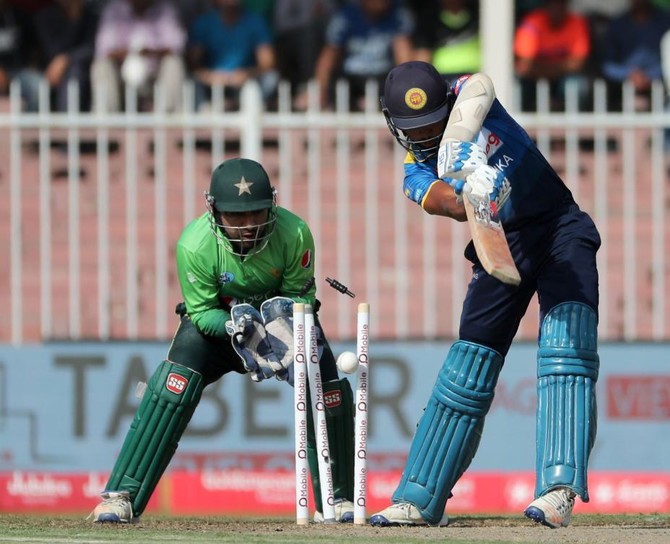LAHORE, Pakistan: Tens of thousands of security will be deployed in Lahore on Sunday when Sri Lanka become the first major cricket team to visit Pakistan since they were targeted in a deadly ambush in 2009 — with attack survivors among those returning to the scene.
Several Sri Lankan players and officials, including their head coach, have opted out of the Twenty20 fixture, after some voiced concern about security following ongoing militant attacks.
But Asanka Gurusinha and Hashan Tillakaratne, who came under gunfire in 2009 and are now Sri Lanka’s team manager and batting coach, will be with the squad as it is shuttled in and out of Lahore’s Qaddafi Stadium under heavy guard.
Pakistan’s Ahsan Raza, a reserve umpire in 2009 who was among those shot — and needed emergency surgery to repair a collapsed lung and damaged liver — will also be on the field.
Eight people were killed and eight wounded in the March 3, 2009 attack on Sri Lanka’s bus convoy near the Qaddafi Stadium, an incident which brought cricket tours to Pakistan screeching to a halt.
Eight years later, Sri Lanka will become the first top cricket nation to play in Pakistan since the incident, accelerating a gradual resumption of international fixtures as security improves.
Sunday’s game, the third and final Twenty20 — with the other two played in UAE — comes after Lahore also hosted this year’s Pakistan Super League final and a one-off fixture between Pakistan and a World XI last month.
Raza was wounded when Pakistani Taliban militants targeted a bus carrying officials, killing the driver. Another bus’s driver was hailed as a hero after shepherding the players to safety under a hail of bullets.
“It’s a great honor that I will be umpiring in the match which is bringing Sri Lanka back to Lahore,” he told AFP.
“They have set their every fear aside... their tour will have a great impact on the revival of cricket in Pakistan.”
Sunday’s Twenty20 international is being hailed as a brave decision by Sri Lanka and a milestone for Pakistan as it attempts to end its sporting isolation.
Thousands of security personnel will guard routes to the stadium, and air surveillance and intelligence monitoring is also in place as Pakistan rolls out head-of-state level measures.
Pakistan Cricket Board chairman Najam Sethi called it a “historic moment,” pointing out that a generation of fans in the cricket-mad country have grown up without seeing any international games in their home stadiums.
“Our stadiums have remained empty. Now all that is poised to change, for the better... I foresee a full fledged restoration in the next two years,” he told AFP.
PCB officials are already setting their sights on bringing the West Indies to Pakistan for three T20 internationals next month.
But Sri Lanka’s visit was not fully backed by its players: regular skipper Upul Tharanga, Lasith Malinga, Niroshan Dickwella, Dushmantha Chamera, and Akila Dananjaya all pulled out, as did their South African head coach Nic Pothas and physiotherapist Nirmalan Thanabalasingham.
Suranga Lakmal, who still carries the splinter from a bullet wound in his leg, and fellow 2009 survivor Chamara Kapugedara also stayed away.
Stand-in skipper Thisara Perera, who played in Lahore last month as part of the World XI team, praised the security arrangements and said he had no concerns about safety.
“I am really satisfied with the security, so no problems there,” he told AFP.
Fans are also applauding Sri Lanka’s decision to return to Lahore, and this week many headed out to buy last-minute tickets for Sunday’s game.
“I am very happy really, as I have purchased tickets for me and my family members,” one woman said in Lahore’s upscale Gulberg neighborhood.
The country’s most famous supporter, Sufi Jalil, fondly known as “Chacha Cricket” (Uncle Cricket), who aims to attend every Pakistan match regardless of the venue, was himself on the way to Qaddafi Stadium when the attack took place in 2009.
“They are welcome,” he said of Sri Lanka.
“What happened in the past is behind us, this match will be a new beginning and we are all united in this cause.”


























